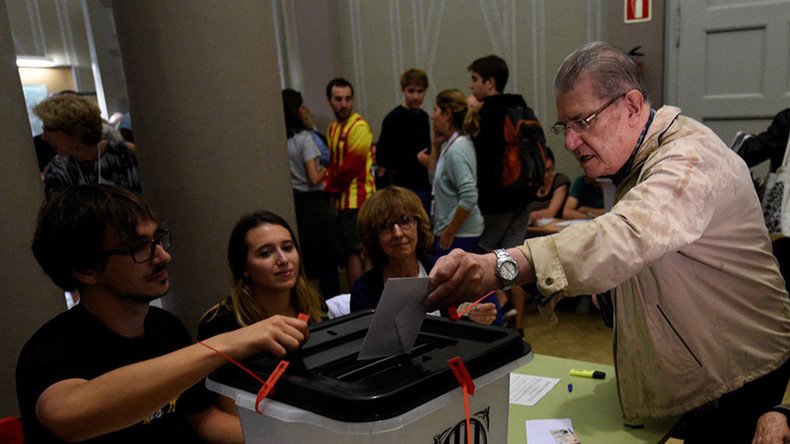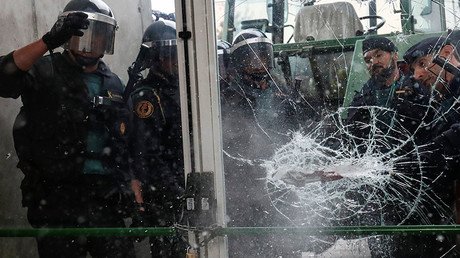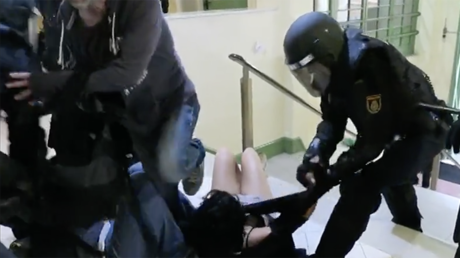‘Double standard & hypocrisy’: Serbian president on EU denouncement of Catalan referendum

Serbian President Aleksandar Vucic has accused the EU of hypocrisy and double-standards following its denouncement of the Catalonian referendum as illegal, while acknowledging the independence of the breakaway province of Kosovo.
"The question every citizen of Serbia has for the European Union today is: How come that in the case of Catalonia the referendum on independence is not valid, while in the case of Kosovo secession is allowed even without a referendum," B92 quoted Vucic as saying during a news conference.
"How did you proclaim the secession of Kosovo to be legal, even without a referendum, and how did 22 European Union countries legalize this secession, while destroying European law and the foundations of European law, on which the European policy and EU policy are based?"
On Monday the European Commission echoed the Spanish government’s stance that the referendum held in Catalonia was illegal, describing the events on Sunday, which saw voters being beaten by Spanish riot police, as an “internal matter”. By contrast in 2010, the European Parliament adopted a resolution urging its member states to recognize Kosovo’s independence.
"This is the best example of the double standards and hypocrisy of the world politics," Vucic said.
The largely ethnic-Albanian province of Kosovo declared independence from Serbia in 2008 after a war in 1999 which saw the US and its NATO allies intervene on behalf of Albanian rebels against the government of what was then Yugoslavia.
NATO’s mission, however, lacked a UN Security Council mandate, and according to Human Rights Watch, up to 528 Yugoslav civilians were killed during the bombing campaign between March and June 1999.
Serbian sources put the death toll much higher, possibly as many as 2,500 civilian casualties including 89 children.
NATO's targets were not exclusively military sites, but also included civilian buildings, such as the Serb Radio and Television (RTS) headquarters in Belgrade, which led to 16 deaths.
After the war, many ethnic Serbs, who formed around 10 percent of the population, fled the province fearing reprisals from Albanian militias. The Republic of Kosovo is now split into seven administrative zones, with the region’s remaining Serbian population occupying the Mitrovica district in the north.
Russia has consistently pointed out the hypocrisy in the EU allowing the Kosovars to declare independence at Serbia’s expense, but condemning the 2014 referendum in Crimea which saw the formerly Ukrainian peninsula join the Russian Federation.
The reunification of Crimea with Russia has been a contentious issue between Russia and Western governments which have attempted to hold Moscow accountable through sanctions.
“Our western partners created the Kosovo precedent with their own hands. In a situation absolutely the same as the one in Crimea they recognized Kosovo’s secession from Serbia legitimate while arguing that no permission from a country’s central authority for a unilateral declaration of independence is necessary,” President Vladimir Putin told the Russian parliament in 2014.
“It’s beyond double standards,” Putin said.
The central government in Madrid deployed thousands of extra police officers to Catalonia Sunday to prevent the independence referendum from taking place.
Nevertheless, millions of Catalans took to the streets to cast their ballots. The ensuing crackdown by Spanish security forces left some 893 people injured, according to Catalan authorities.
The Spanish government announced Monday that it would consider proposals to settle the crisis put forward by other political forces, provided they are aimed at the “common good and the defense of our democratic system.”
Prime Minister Mariano Rajoy had already held consultations with other parties, including the Socialists and the centrist Ciudadanos, it said in a statement.
It further stated that Rajoy voiced support for the security forces, commending their handling of the referendum issue and also expressed gratitude to the EU leaders that backed Madrid in its dispute with Catalonia.














